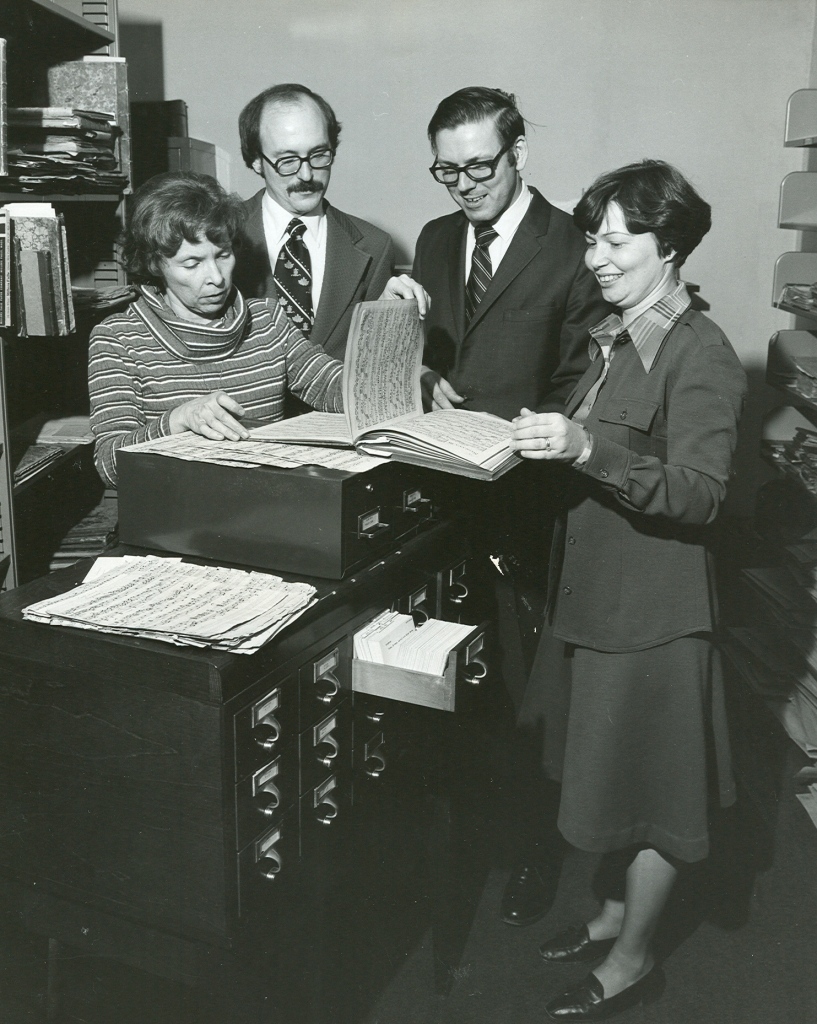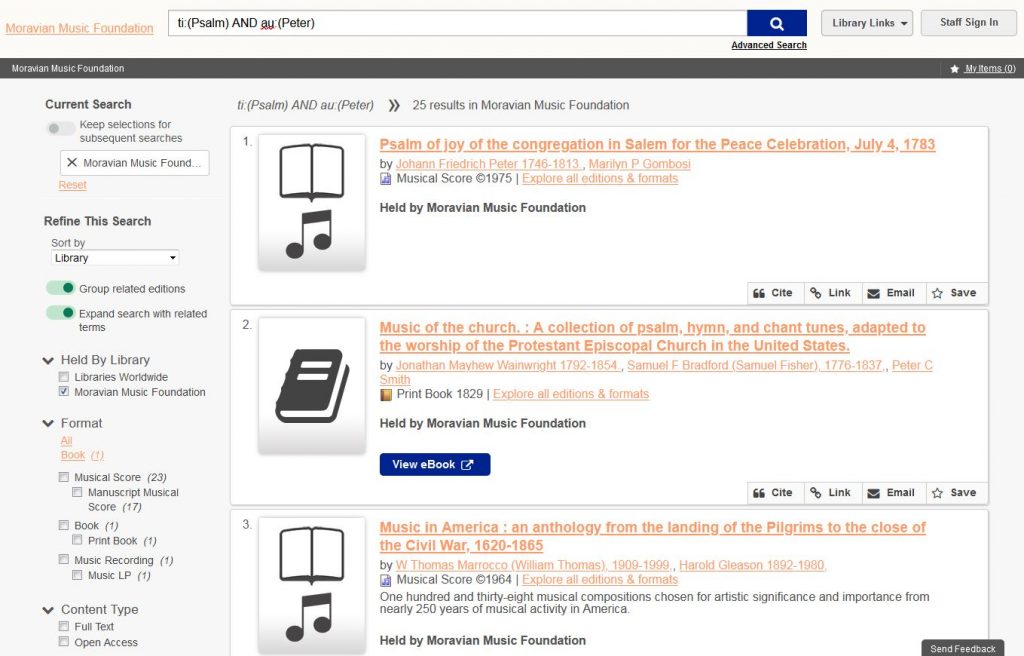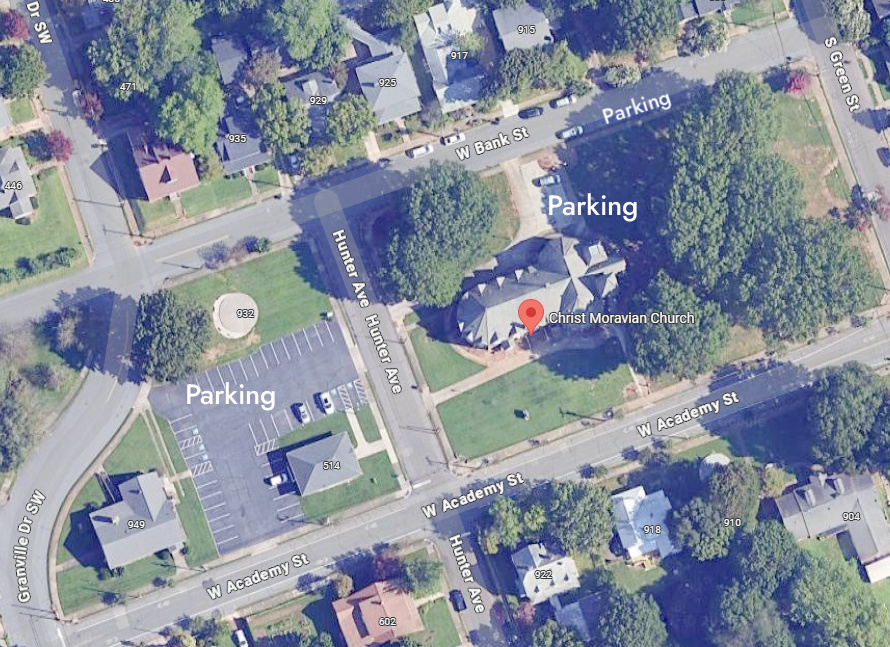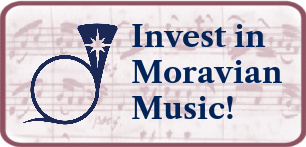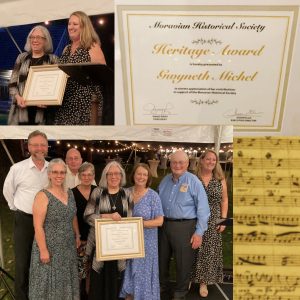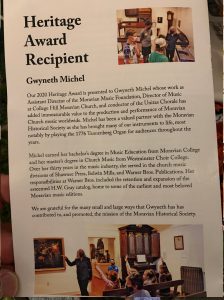
Online Searchable Catalog of Archival Holdings
Barbara Strauss and David Blum
Barbara Strauss and David Blum concluded their work at the end of March and early April, 2023. Their work on the GemeinKat Project has been exemplary and stellar, and they leave a refined, informative, and accessible catalog that shares information about thousands of Moravian music titles.
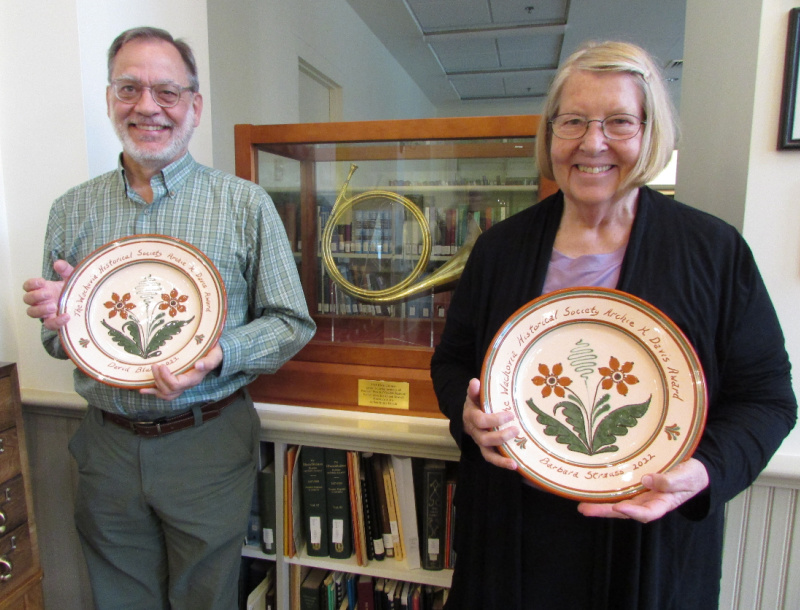
Letter by Jennifer Ward, RISM – Répertoire International des Sources Musicales
“I am writing from the RISM Editorial Center in Frankfurt, Germany. My office is responsible for coordinating the RISM (Répertoire International des Sources Musicales, the International Inventory of Musical Sources) project worldwide. The Moravian Music Foundation is one of dozens of libraries and archives around the world that contribute to our project to catalog historical music manuscripts and printed editions. The results of this work are published in a database that is available free online (see https://rism.info/).
The Moravian Music Foundation has been involved with RISM since our earliest cataloging projects in the 1960s. However, it is thanks to Barbara Strauss as the Cataloging Project Manager, David Blum as Research Librarian, and their team of catalogers that the valuable and unparalleled holdings of historical music materials under the care of the Foundation have been brought to the attention of a new generation of music researchers. I have had the pleasure of working with our colleagues in Winston-Salem and Bethlehem since 2015 when Barbara got in touch with the U.S. RISM Office at Harvard University, and then with me, in order to ensure that the results of the MMF’s newest cataloging projects were included in RISM. Given the international nature of the RISM database, Barbara’s initiative ensured that the MMF’s collections can be placed in the context of historical music production and transmission and explored by researchers all over the world.
Barbara and the MMF cataloging team have contributed over 5,400 new records to RISM, making the United States among the most active RISM participants. In addition, they have enhanced over 800 records for printed music by adding music incipits and detailed content descriptions. These records are the results of both data transfers and working directly with the RISM cataloging program, Muscat.
But the accomplishments of Barbara’s team cannot be reduced to mere numbers. With their cataloging expertise and initiative, the MMF team has spearheaded the development of new RISM cataloging practices, contributed to the technical development of Muscat, and increased RISM’s profile in the professional community. The MMF catalogers accompanied Muscat as it developed from a manuscripts-only cataloging program to one that could expertly manage the complexity of printed editions. Real-life examples from MMF collections helped ensure that the nuances of printed editions could be accurately captured for both catalogers and users. A new field (Related sources, MARC21 787) was implemented in Muscat at the encouragement of Barbara in order to expose relationships between print culture and the tradition of manuscript transmission (such as a manuscript copied from a printed hymnbook)—a rich symbiosis prevalent throughout the MMF holdings that can now be explored and understood in RISM through structured data. Religious festivals specific to the Moravian church were first introduced to RISM thanks to MMF records. David Blum authored an article in an international journal to instruct librarians how to reuse RISM records (David Blum, “The Moravian Music Foundation Experience Using Bibliographic Records Downloaded from RISM,” Fontes Artis Musicae 64, no. 4 (October-December 2017): 355-366). And the 2020 Beethoven Year boosted RISM’s profile for 19th-century music when the MMF team cataloged their rare Beethoven printed editions for RISM—copies that were not included in the recent Ludwig van Beethoven. Thematisch-bibliographisches Werkverzeichnis (Henle, 2014), but they are now in RISM.
Barbara Strauss has informed me that her cataloging project is coming to a close at the end of this month and the Moravian Music Foundation will continue their participation in RISM in only a starkly reduced form. I hope that this letter makes it clear what a valuable partner the Moravian Music Foundation has been to RISM during the past 8 years. A project such as RISM can only succeed with international cooperation. This principle has been true ever since RISM was founded in the 1950s under the auspices of UNESCO, the International Association of Music Libraries, and the International Musicological Association, but it is arguably truer now than it has ever been before in the age of linked open data, digital humanities, and constantly changing technological landscapes. Indeed, despite the prevalence and availability of information about music on the internet, it is easy to forget that it takes real people to ensure that it is put online in the first place. RISM needs people “on the ground” in libraries and archives to accurately describe their historical holdings, which is by far the most effective way to contribute to RISM, rather than sending my office spreadsheets for us to decipher from afar.
The end of this phase of RISM contributions from the Moravian Music Foundation will have a noticeable impact on both the quantity and quality of future RISM data. I am grateful for the work of Barbara Strauss, David Blum, and their team. I am glad that cooperation will continue between the Moravian Music Foundation and RISM, but at the same time I hope that a way can be found for the team to continue in full numbers in the future.
Sincerely, Jennifer Ward
Répertoire International des Sources Musicales (RISM)
GemeinKat is on Worldcat.org
This online searchable database contains the catalog of most of MMF’s archival, reference, and in-print holdings and offerings.
The entire catalog resides online as a subset of WorldCat.org but may also appear in a general Google and other search engine results.
Further Definition of “GemeinKat”
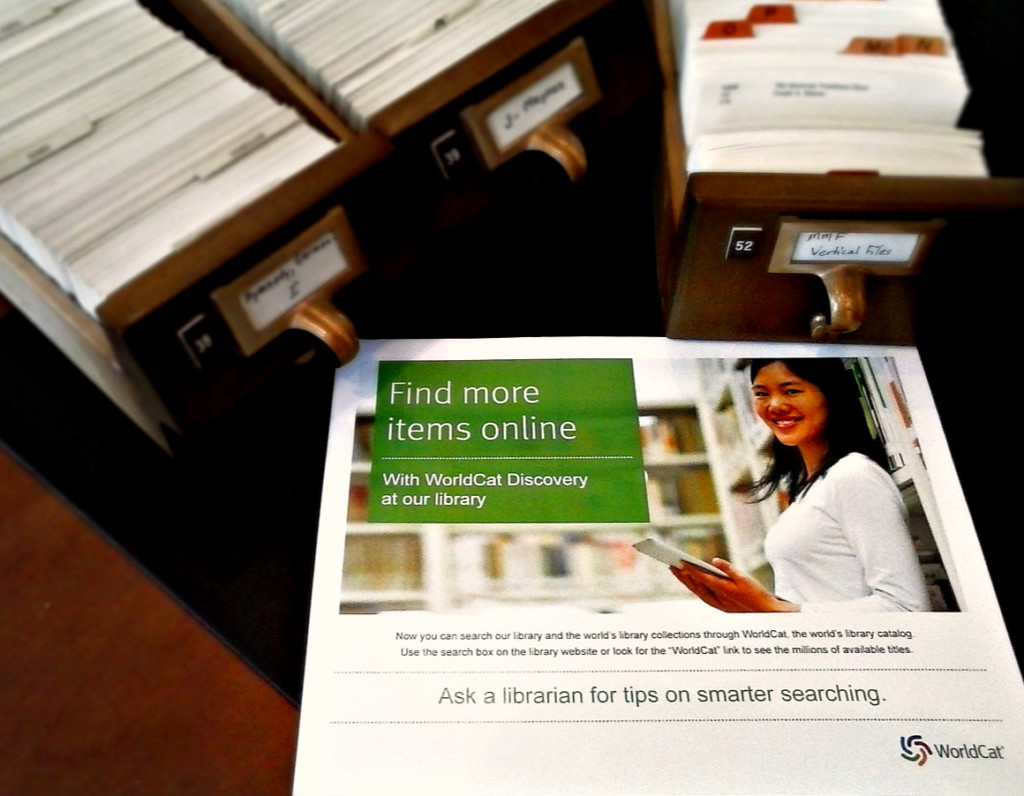
The Moravian Music Foundation provides free online access to the GemeinKat catalog of collections, which allows scholars and musicians to locate items within the extensive holdings of the Moravian Music Foundation and other libraries.
About the GemeinKat Cataloging Project:
Since the catalog includes the collections of the Moravian communities from the 18th through the 21st centuries, the name GemeinKat is reflective of that purpose (Gemein- from the German word for community or fellowship, and Kat for catalog).
.
GemeinKat: the Voyage Home
a video about the cataloging project and the collections
GemeinKat is the project to upload a new and enhanced digital records to the OCLC and RISM databases. GemeinKat is available to the public, on the internet, at moravianmusic.on.worldcat.org and is a WorldCat Discovery catalog, developed by OCLC, a nonprofit organization that provides services to thousands of libraries worldwide. Through WorldCat, users have the potential to access more than 1.8 billion items in libraries around the world.
Please visit our Researching at MMF page for more information about doing scholarly research within these unique collections at the Moravian Music Foundation.
Update on GemeinKat (10/28/2021)
Those of you who’ve been following the Moravian Music Foundation for some time will be aware of the ongoing GemeinKat project – converting the more-than-50,000 cards in our card catalog to electronic, online records accessible world-wide! We actually started planning this project and doing some work “in the background” almost 15 years ago, but it was only 7 years ago that we were able to move “full-speed-ahead” with the project.
It was fall of 2014 when Barbara Strauss and Dave Blum joined our staff to tackle this project, and they are in the throes of completing some large collections, updating and enhancing the information through research as they go. Dave and Barbara have been able to identify a great many pieces that were previously listed as “anonymous” or “unidentified”; they’ve moved a few things around to get all the parts to a piece together; and all in all the project has greatly enhanced the body of knowledge about Moravian music! – (3/1/2021)
Below, are the full reports in PDF for 10/28/2021:
Current Project Status
Project Timeline
Remaining Steps to Completion
GemeinKat is Integral to MMF’s Mission & Vision
MMF’s Catalog is Important to Music History
A lecture by Barbara Strauss:
GemeinKat Catalog Project
BLOG – GemeinKat: Keeping Track of the Details, by Barbara Strauss, Project Manager

Keeping Track of Details
A BLOG about cataloging the collection
by Barbara Strauss,
Cataloging Project Manager
https://moravianmusic.on.worldcat.org/discovery
EXAMPLE – Opening Search Page of Gemeinkat

Searching Tool Kit
Searching, Researching, Finding Moravian Music
About GEMEINKAT
About RISM
About FINDING AIDS
About ARCHIVEGRID
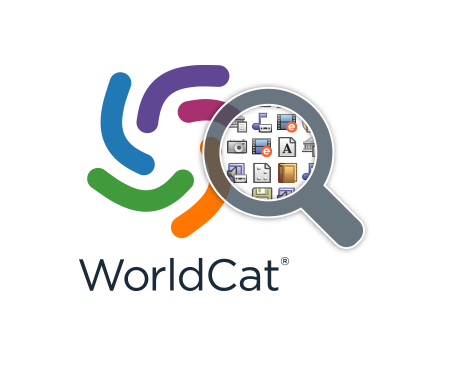
Type a keyword, composer, title, etc.
to begin your search…
Collection Catalogs in Print
- Salem Congregation Collection – Available for sale on our Books page
- Lititz Congregation Collection – Available for sale on our Books page
- Johannes Herbst Collection – Available for sale on our Books page
Peter Memorial Moravian Reference Library
The Moravian Music Foundation and Moravian Archives Research Library (the books in the reference stacks) have been physically combined, integrated, and classified according to Library of Congress. These and other physical items (monographs, journals, and scores) have been cataloged in the OCLC WorldCat bibliographic database (a resource of nearly 1.8 billion records from over 10,000 libraries).
Please visit our Researching at MMF page for more information about doing scholarly research within these unique collections at the Moravian Music Foundation.
